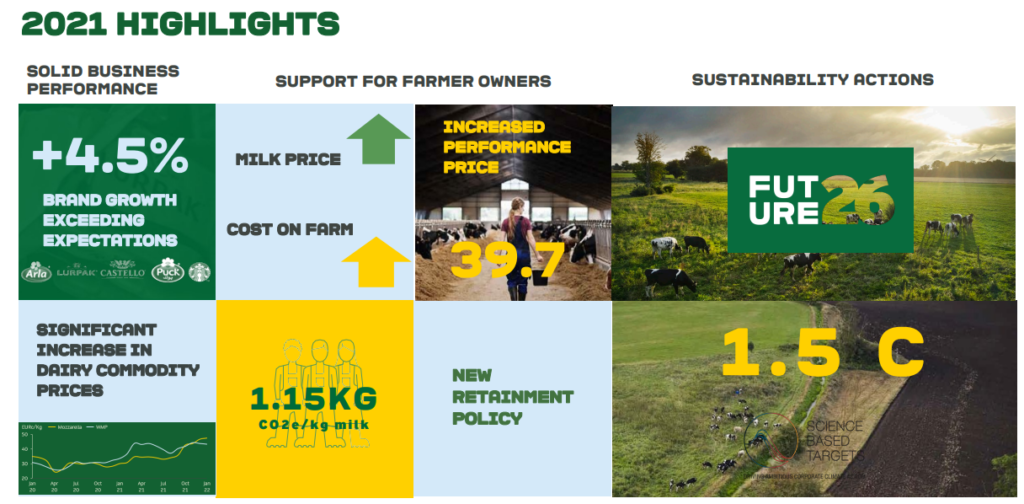Arla has recorded 5.6% growth in total group revenue to €11.2 billion for 2021, despite the difficult market conditions caused by the Covid-19 pandemic and inflation.
Publishing its annual results for last year, the European dairy cooperative said that this revenue boost was as a result of “higher sales prices and strategic sales growth of 4.5%”.
The Danish multinational noted that its farmer owners faced rising costs and additional requirements on their farms over the course of last year; pre-paid milk price increased by 23% in 2021.
Arla’s performance price reflects the value the co-op creates per kilogram of owner milk supplied. Last year, it stood at 39.7c/L compared to 36.5c/L in 2020.
Arla also approved a new policy to increase supplementary payments to farmers to support the investment needed to meet the company’s five-year sustainability strategy, Future26.
The payment will be 1.5c/kg of milk, but is dependent on the company achieving an annual net profit of at least 2.8% of revenue.

Commenting on the results, Arla Foods chair, Jan Toft Norgaard said: “2021 was a tough year on farms as both our members and company were impacted by the continued effects of the pandemic and rapidly rising production costs.
“As such, I am proud that our company has been able to deliver a performance price that puts Arla among the market leaders in Europe and that supports our farmer owners,” he added.
Arla dairy products
The company said retail sales in 2021 were “at the top end of expectations” – its strategic brands had 4.5% branded volume growth.
Arla divides its business into four commercial segments. The European division saw revenue increase from €6.4 billion in 2020 to €6.6 billion last year.
The company’s European food service business saw 7.8% branded volume growth as the hospitality sector re-opened in many countries.
Arla International recorded a 9.1% increase in branded volume growth – revenue increased from €1.9 billion to €2.1 billion last year.
Revenue also improved for Arla Foods Ingredients to €794 million.
“2021 was another year defined by Covid-19 and although the global economy recovered much faster than expected, the volatility of the dairy market and high inflation put pressure on us and our farmer owners.
“With strong operational execution we successfully navigated the global challenges, strengthened our financial position, and grew our brands, while delivering savings across our supply chain,” Torben Dahl Nyholm, Arla Foods CFO, said.
Outlook
Arla is expecting volatility and inflation to continue to impact both its business and other sectors during 2022.
“The impact on consumer behavior of on-going market volatility and high inflation will be multifaceted and difficult to predict. It is likely that we will see a slowdown in our branded growth as the market resettles at a new level.
“Our cooperative stands on a strong foundation and as we have demonstrated in 2020 and 2021, we will continue our strong operational execution throughout our supply chain to meet any new demands and requirements in this uncertain environment,” Peder Tuborgh, Arla Foods CEO, stated.
Over the course of 2022, Arla is planning to spend €600 million in capital investments at facilities in Denmark and Germany, along with further digitalisation in the supply chain.
The company is predicting group revenue this year to be between €11.8 billion and €12.4 billion.
